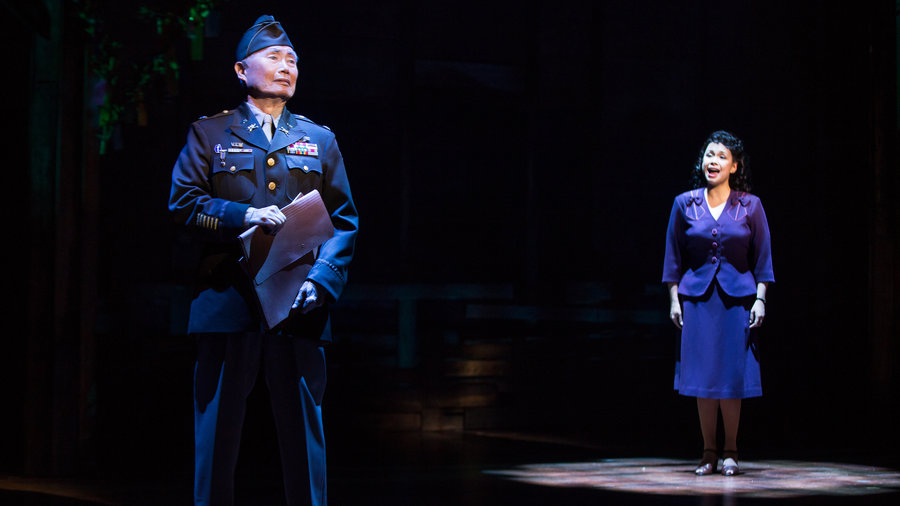
Allegiance. Music & lyrics by Jay Kuo, book by Marc Acito, Jay Kuo and Lorenzo Thione. Stafford Arima directed. Presented in movie theaters by Fathom Events.
Allegiance had a short run on Broadway, but it’s an important play. Fathom Events deserves credit for presenting it in cinemas nationwide in December of 2016, even after its stage run closed. As with its recent transmission of Broadway’s She Loves Me, Fathom continues to bring musical theater productions to a wide national audience.
Allegiance recalls the time when fear of terrorism led the American government to put citizens of Japanese ancestry into detention camps, so its relevance to the present is obvious. As America’s new president considers registering all Muslims, this new musical drama reminds us of a similar period of ethnic targeting. This play adds depth to what previously was a page in a history book.
During World War II approximately 120,000 people of Japanese ancestry were imprisoned in camps. Almost two-thirds of the imprisoned were born in the United States; it made no difference that many had never even been to Japan. Anyone with at least one-sixteenth (equivalent to having one great-great grandparent) Japanese ancestry was targeted. At the same time, Italian-Americans and German-Americans were not.
This play personalizes that dark episode, and brings the story to life.
George Takei, Mr. Sulu on the original Star Trek, was a child during World War II and he remembers his family being interned because of its race. He wrote about his experiences, then developed this musical. He also played a featured role in the production.
Allegiance shows the fictional Kimura family as they are forced to leave their farm in Salinas, California and relocate to the Heart Mountain internment camp in Wyoming. President Roosevelt authorized the deportation and incarceration with Executive Order 9066, issued February 19, 1942. The Supreme Court ruled that the action was a wartime necessity.
There was significant public support for this action. Austin Anson, managing secretary of the Salinas Vegetable Grower-Shipper Association, told the Saturday Evening Post in 1942: “We’re charged with wanting to get rid of the Japs for selfish reasons. We do. It’s a question of whether the white man lives on the Pacific Coast or the brown men. They came into this valley to work, and they stayed to take over.”
The Japanese-Americans had to sell their properties at a loss and give up personal belongings. Allegiance showed the internees separated into male and female lines, and some of them forced to strip to their underwear as they enter the camp. This, of course, shocks us with its similarity to the procedures at Nazi concentration camps.
Conflict was portrayed within the family as Sammy (Telly Leung) asks to join the U.S. army to prove he’s a patriotic American, while his sister’s boyfriend Frankie (Michael K. Lee) leads a protest against the government. “They didn’t lock up Joe DiMaggio,” the young man says angrily.
Lea Salonga, who made her Broadway debut playing a Vietnamese in 1991 in Miss Saigon, was a standout as the sister. Sammy’s father (Christopheren Nomura) is helpless in his inability to protect his family, and goes to prison when he defies the authorities. Takei was charming as her grandfather who genially continues his flower-tending even in the arid Wyoming soil. He also played the elderly Sammy in a prologue and epilogue.
A character named Mike Masaoka (Greg Watanabe) appears as a spokesman for Japanese-Americans who urge cooperation. He was a real person, the head of the Japanese American Citizens League who tried to keep his people calm as he worked through channels to allow some internees leave the camps to serve in the armed forces.
Most of the internees were not freed until the end of the war, when they were given bus rides and $25 in cash to go back to the towns where their homes had been.
The play posed the tough question: How can anyone fight for a country that has imprisoned your family? The story was told with some contrivance but was generally compelling. Most of the music, unfortunately, was mediocre. A few songs have a Japanese flavor which is appealing, and there’s a catchy jitterbug number, but most of the score is generic Broadway belting. The best music was Salonga’s “Gaman,” which means to “endure with fortitude.”